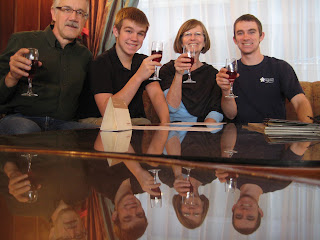We have all wanted to visit the pyramids, the sphinx, the temples of the pharaohs, chaotic Cairo. After four months in (relatively) barren Saudi Arabia, we dreamed of meeting up with Chris somewhere in between Austin and Jubail, in the center of the arab world, and also enjoying some family and rest time on a cruise down the Nile...a romantic idea for centuries.
Past family trips have been shorter and more spontaneous, with more emphasis on do-it-yourself and going low-cost. This time, because of the foreign nature of the place and its chaotic and frankly untrustworthy reputation, and because we are earning more now, we decided to splurge on a travel agent arrangements -- once the cost is sunk, we relax and enjoy the itinerary without having to negotiate the taxi or the restaurant or the tourguide or the ticket booth -- the obnoxious hawkers still swarm us at each stop. Something in the culture makes these hawkers more irritating than those in India. Coleman notes that the Egyptian sellers have a broader repertory of responses to customer reluctance -- that is partly linguistic, but also cultural in that they have less reluctance to intrude upon another's life. India is, after all, the home of the Desiderata, wherein you do your thing and I do my thing. The tourist in Egypt is clearly foreign, will be gone tomorrow, so the resource should be extracted without remorse. Every seemingly friendly gesture from a local is thus likely to have behind it an effort to get money from me, by hook or crook -- the country is filled with Amway salesmen!
But we find some respite on a cruise ship -- the photo shows our welcome fruit drink. The Radamis2 ship seems to be in the middle of the rankings of the various cruise ships on the river, from what we see -- old, but in great shape, well-maintained. A tiny fitness room allows us to feel like we are burning off the calories consumed at the groaning board offered in L'Orangerie.
Our cabin is on the port side, thus facing the west bank of the Nile as the boat heads downstream toward Luxor. We have a surprisingly large picture window that affords a clear view. Soon after Aswan, the riverbank appears unmarred by human construction or trash, though it has obviously been cultivated and turned to pasture, with numerous cows and donkeys and horses feeding along the bank. The occasional village is clustered well above the bank, in anticipation of the annual floods -- much more controlled since the construction of the Aswan Dam (completed forty years ago).





Comments
Post a Comment